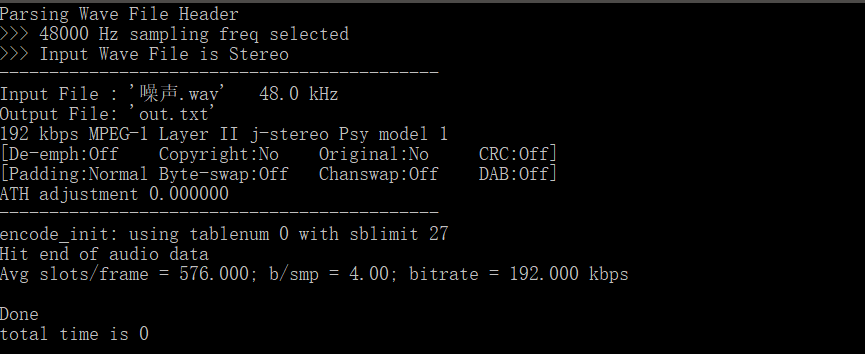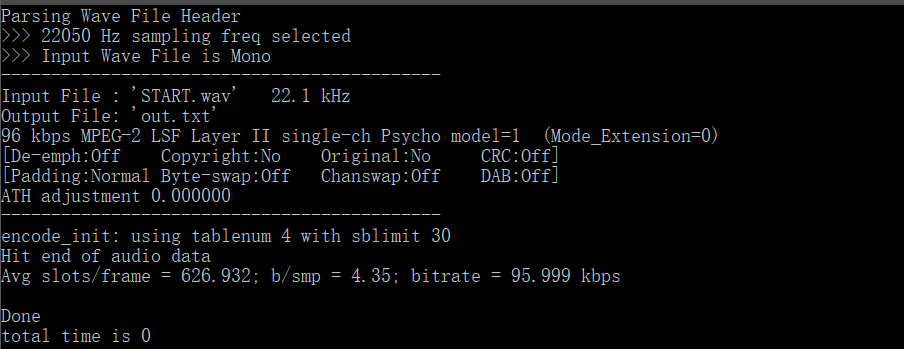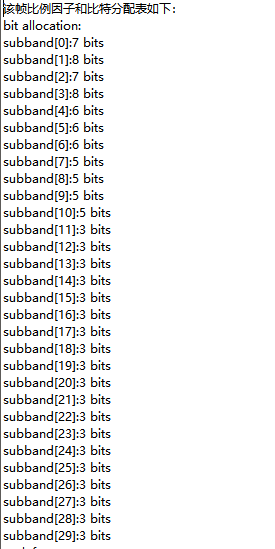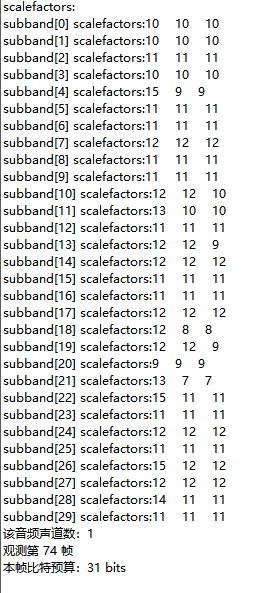1, Overall framework of programming
1. Principle of MPEG-1 Audio LayerII encoder
The source output is decomposed into subbands of different frequencies, and then the subbands of different frequencies are encoded
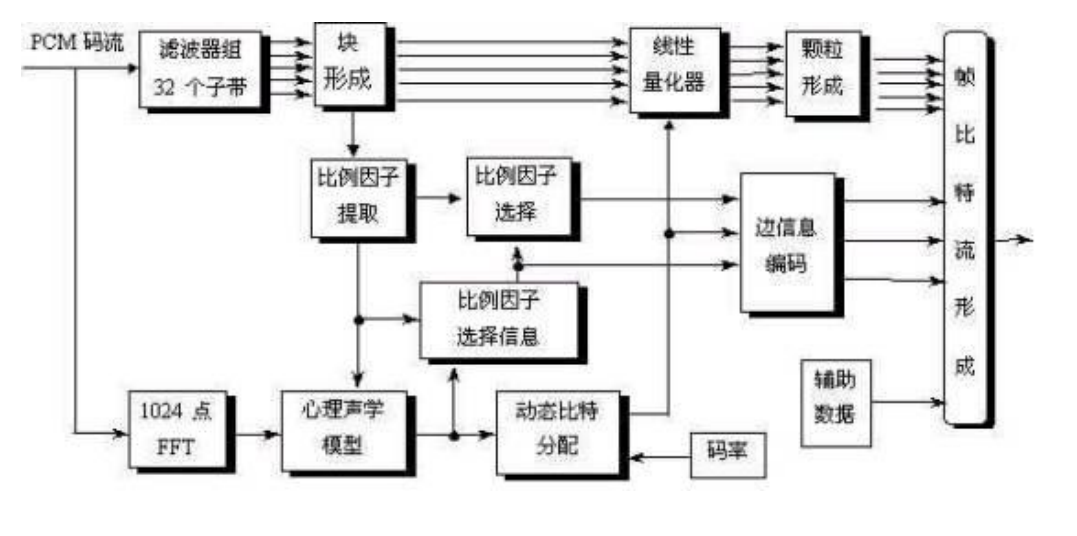


2. Psychoacoustic model
Through the subband analysis filter bank, the signal has high time resolution to ensure that the encoded sound signal has high enough quality in the case of short shock signal
(1) Transform the sample to frequency domain
- 32 equal sub-band signals can not accurately reflect the auditory characteristics of human ears.
FFT is introduced to compensate the problem of insufficient frequency resolution.
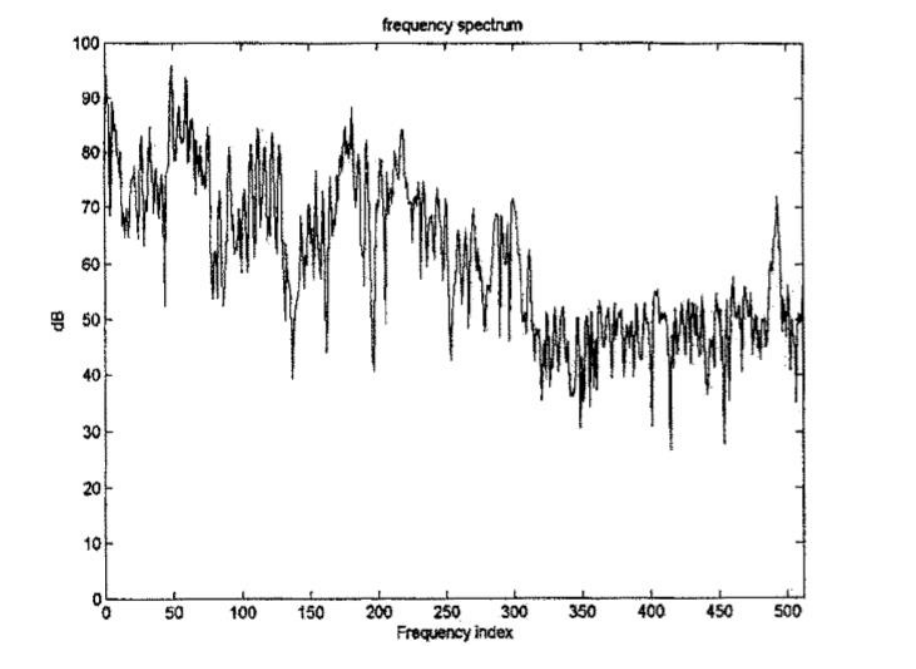
(2) Determine sound pressure level

(3) Consider quiet threshold
In the standard, there is a table of "frequency, critical band rate and absolute threshold" compiled according to the sampling rate of the input PCM signal.
(4) Audio signal decomposition
Decompose the audio signal into "tones" and "non tones / noise": because the masking ability of the two signals is different
(5) Elimination of tonal and non tonal masking components
Using the absolute threshold given in the standard to eliminate the masked components;
Consider that in each critical frequency band, only the component with the highest power is retained in the distance less than 0.5Bark
(6) Elimination of tonal and non tonal masking components
The single masking threshold of tonal component and non tonal component is obtained according to the algorithm given in the standard.
(7) Elimination of tonal and non tonal masking components
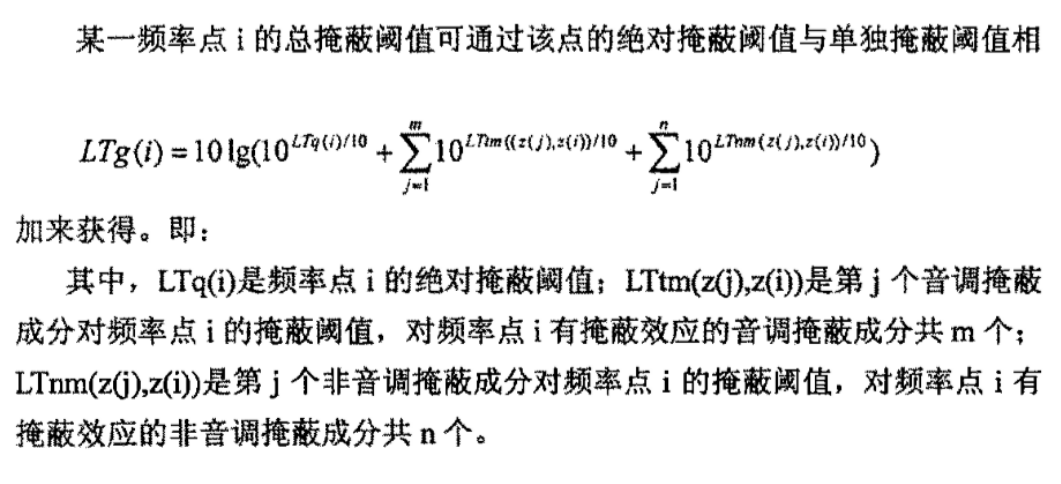
The influence of masking effect should also be considered.
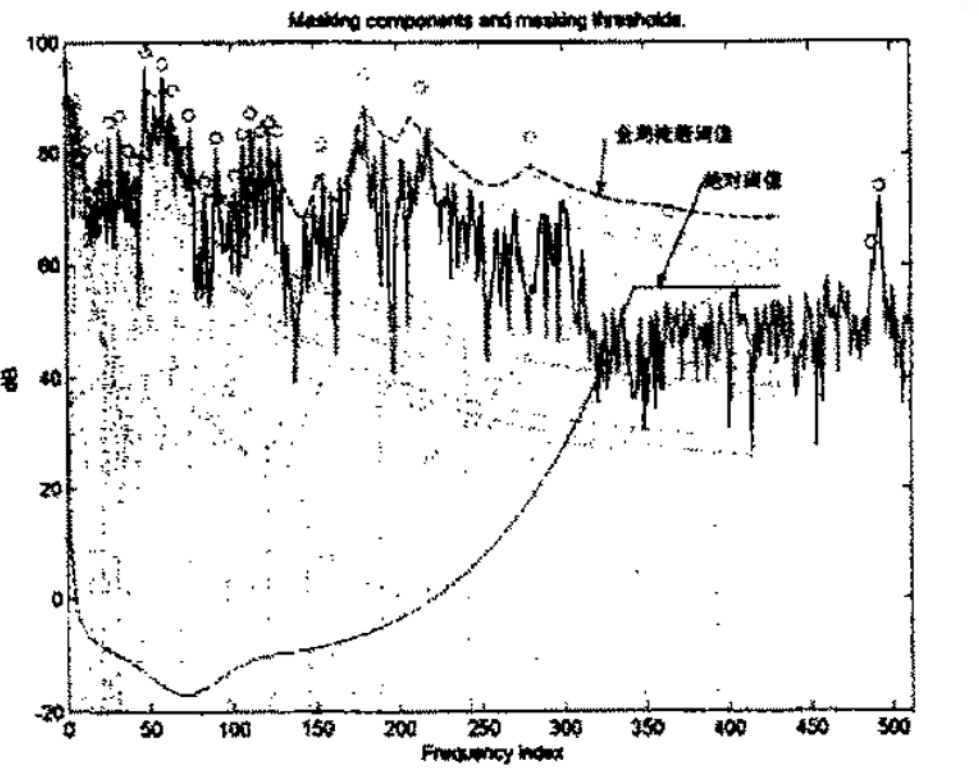
(8) Elimination of tonal and non tonal masking components
- Select the minimum threshold in this subband as the subband threshold
- The critical frequency band in the high frequency region is very wide and may span multiple subbands, resulting in model 1 concentrating all the non tonal parts in the critical bandwidth into a representative frequency. When a subband is far away from the representative frequency in a wide frequency band, it is impossible to obtain an accurate non tonal masking value. But the amount of calculation is low.
- Select the minimum threshold in this subband as the subband threshold
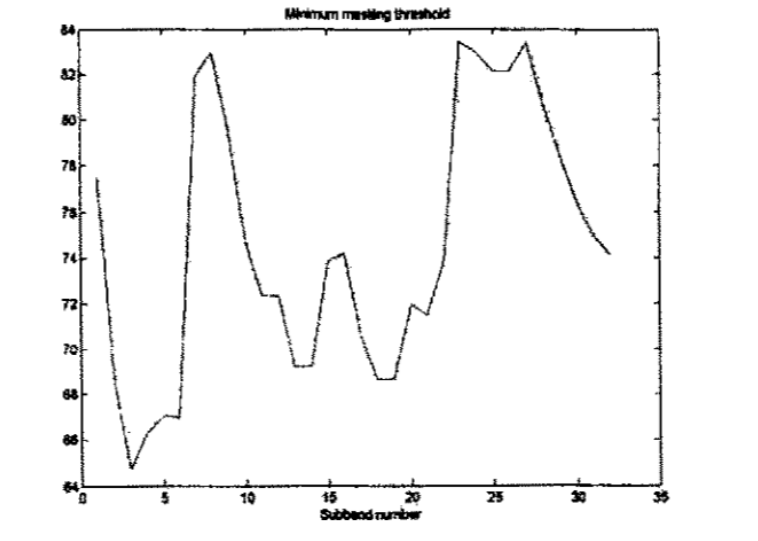
(9) Calculate masking ratio SMR
SMR = signal energy / Masking Threshold
The masking ratio of each subband signal is calculated and the SMR is transmitted to the coding unit
3. Polyphase filter bank design
- Transform PCM samples into 32 subband frequency domain signals
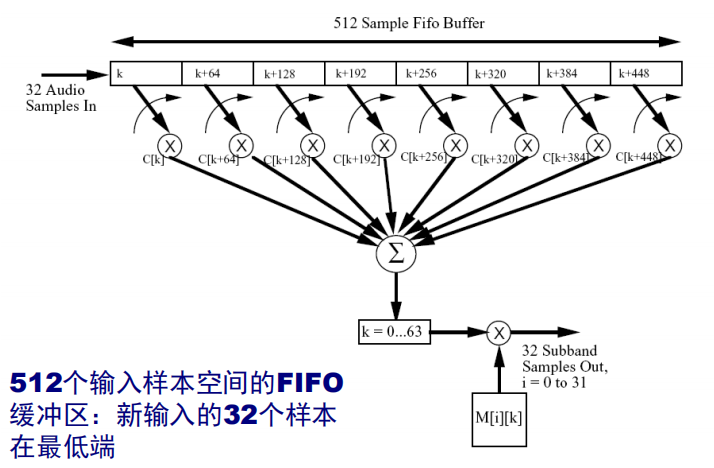
(1) Quantization and coding
① Value and code of scale factor
The scale factor is calculated every 12 samples in each subband. First determine the maximum absolute value of the 12 sample points. Look up the minimum value larger than the maximum value in the scale factor table as the scale factor. Represented by 6 bits.
A frame of layer 2 corresponds to 36 subband samples, which is three times that of layer 1. In principle, three scale factors should be transmitted. In order to reduce the transmission rate of the scale factor, a coding strategy using the time-domain masking characteristics of human ear is adopted.
The three scale factors of each subband in each frame are considered together and divided into specific modes. According to these modes, one, two or three scale factors and scale factor selection information (2 bits per subband) are transmitted together. If there is only a small difference between one scale factor and the next, only the large one is transmitted, which often occurs for steady-state signals.
After using this algorithm, compared with layer 1, the scale factor of layer 2 transmission is reduced by 2 on average, that is, the transmission bit rate is reduced from 22.5Kb/s to 7.5Kb/s.
② Bit allocation and coding
Before adjusting to a fixed code rate, determine the number of effective bits that can be used for sample value coding, which depends on the scale factor, scale factor selection information, bit allocation information and the number of bits required for auxiliary data
Bit allocation process
The masking noise ratio MNR is calculated for each subband, which is SNR – SMR, that is, MNR = SNR – SMR
Minimize the total noise masking ratio of the whole frame and each subband. This is a cyclic process. Each cycle increases the quantization level of the subband that benefits the most by one level. Of course, the number of bits used cannot exceed the maximum number that can be provided by a frame.
One frame of layer 1 allocates 4 bits to the bits of each subband for information coding; The second layer only uses 4 bits in the low frequency band and 2 bits in the high frequency band.
③ Quantization and coding of subband samples
The input takes 12 samples as a group. After time-frequency conversion, each group of samples carries out a bit allocation and records a scale factor
The bit allocation information tells the decoder that each sample is represented by several bits, and the scale factor is represented by 6 bits. The decoder uses this 6-bit scale factor to multiply each output sample value of the inverse quantizer to recover the quantized subband value. The function of the scale factor is to make full use of the quantization range of the quantizer. Through the combination of bit allocation and scale factor, it can represent samples with a dynamic range of more than 120dB.
In layer 2, the number of quantization levels varies with different subbands, but the quantization level still covers the range of 3 ~ 65535. At the same time, the probability of subbands not being allocated to bits increases, and subbands not allocated to bits are not quantized. There are 15 levels of quantization in the low frequency band, 7 levels in the medium frequency band and only 3 levels in the high frequency band.
2, Specific program implementation
m2aenc.c
#include <stdio.h>
#include <stdlib.h>
#include <string.h>
#include <time.h>
#include "common.h"
#include "encoder.h"
#include "musicin.h"
#include "options.h"
#include "audio_read.h"
#include "bitstream.h"
#include "mem.h"
#include "crc.h"
#include "psycho_n1.h"
#include "psycho_0.h"
#include "psycho_1.h"
#include "psycho_2.h"
#include "psycho_3.h"
#include "psycho_4.h"
#include "encode.h"
#include "availbits.h"
#include "subband.h"
#include "encode_new.h"
#include "m2aenc.h"
#include <assert.h>
FILE *musicin;
Bit_stream_struc bs;
char *programName;
char toolameversion[10] = "0.2l";
void global_init (void)
{
glopts.usepsy = TRUE;
glopts.usepadbit = TRUE;
glopts.quickmode = FALSE;
glopts.quickcount = 10;
glopts.downmix = FALSE;
glopts.byteswap = FALSE;
glopts.channelswap = FALSE;
glopts.vbr = FALSE;
glopts.vbrlevel = 0;
glopts.athlevel = 0;
glopts.verbosity = 2;
}
/************************************************************************
*
* main
*
* PURPOSE: MPEG II Encoder with
* psychoacoustic models 1 (MUSICAM) and 2 (AT&T)
*
* SEMANTICS: One overlapping frame of audio of up to 2 channels are
* processed at a time in the following order:
* (associated routines are in parentheses)
*
* 1. Filter sliding window of data to get 32 subband
* samples per channel.
* (window_subband,filter_subband)
*
* 2. If joint stereo mode, combine left and right channels
* for subbands above #jsbound#.
* (combine_LR)
*
* 3. Calculate scalefactors for the frame, and
* also calculate scalefactor select information.
* (*_scale_factor_calc)
*
* 4. Calculate psychoacoustic masking levels using selected
* psychoacoustic model.
* (psycho_i, psycho_ii)
*
* 5. Perform iterative bit allocation for subbands with low
* mask_to_noise ratios using masking levels from step 4.
* (*_main_bit_allocation)
*
* 6. If error protection flag is active, add redundancy for
* error protection.
* (*_CRC_calc)
*
* 7. Pack bit allocation, scalefactors, and scalefactor select
*headerrmation onto bitstream.
* (*_encode_bit_alloc,*_encode_scale,transmission_pattern)
*
* 8. Quantize subbands and pack them into bitstream
* (*_subband_quantization, *_sample_encoding)
*
************************************************************************/
int frameNum = 0;
int main (int argc, char **argv)
{
typedef double SBS[2][3][SCALE_BLOCK][SBLIMIT];
SBS *sb_sample;
typedef double JSBS[3][SCALE_BLOCK][SBLIMIT];
JSBS *j_sample;
typedef double IN[2][HAN_SIZE];
IN *win_que;
typedef unsigned int SUB[2][3][SCALE_BLOCK][SBLIMIT];
SUB *subband;
frame_info frame;
frame_header header;
char original_file_name[MAX_NAME_SIZE];
char encoded_file_name[MAX_NAME_SIZE];
short **win_buf;
static short buffer[2][1152];
static unsigned int bit_alloc[2][SBLIMIT], scfsi[2][SBLIMIT];
static unsigned int scalar[2][3][SBLIMIT], j_scale[3][SBLIMIT];
static double smr[2][SBLIMIT], lgmin[2][SBLIMIT], max_sc[2][SBLIMIT];
// FLOAT snr32[32];
short sam[2][1344]; /* was [1056]; */
int model, nch, error_protection;
static unsigned int crc;
int sb, ch, adb;
unsigned long frameBits, sentBits = 0;
unsigned long num_samples;
int lg_frame;
int i;
/* Used to keep the SNR values for the fast/quick psy models */
static FLOAT smrdef[2][32];
static int psycount = 0;
extern int minimum;
time_t start_time, end_time;
int total_time;
/*-------------------------*/
FILE* Trace = NULL;
fopen_s(&Trace, "trace.txt", "w");
fprintf(Trace, "The frame scale factor and bit allocation table are as follows:\n");
/*------------------------*/
sb_sample = (SBS *) mem_alloc (sizeof (SBS), "sb_sample");
j_sample = (JSBS *) mem_alloc (sizeof (JSBS), "j_sample");
win_que = (IN *) mem_alloc (sizeof (IN), "Win_que");
subband = (SUB *) mem_alloc (sizeof (SUB), "subband");
win_buf = (short **) mem_alloc (sizeof (short *) * 2, "win_buf");
/* clear buffers */
memset ((char *) buffer, 0, sizeof (buffer));
memset ((char *) bit_alloc, 0, sizeof (bit_alloc));
memset ((char *) scalar, 0, sizeof (scalar));
memset ((char *) j_scale, 0, sizeof (j_scale));
memset ((char *) scfsi, 0, sizeof (scfsi));
memset ((char *) smr, 0, sizeof (smr));
memset ((char *) lgmin, 0, sizeof (lgmin));
memset ((char *) max_sc, 0, sizeof (max_sc));
//memset ((char *) snr32, 0, sizeof (snr32));
memset ((char *) sam, 0, sizeof (sam));
global_init ();
header.extension = 0;
frame.header = &header;
frame.tab_num = -1; /* no table loaded */
frame.alloc = NULL;
header.version = MPEG_AUDIO_ID; /* Default: MPEG-1 */
total_time = 0;
time(&start_time);
programName = argv[0];
if (argc == 1) /* no command-line args */
short_usage ();
else
parse_args (argc, argv, &frame, &model, &num_samples, original_file_name,
encoded_file_name);
print_config (&frame, &model, original_file_name, encoded_file_name);
/* this will load the alloc tables and do some other stuff */
hdr_to_frps (&frame);
nch = frame.nch;
error_protection = header.error_protection;
while (get_audio (musicin, buffer, num_samples, nch, &header) > 0) {
if (glopts.verbosity > 1)
if (++frameNum % 10 == 0)
fprintf (stderr, "[%4u]\r", frameNum);
fflush (stderr);
win_buf[0] = &buffer[0][0];
win_buf[1] = &buffer[1][0];
adb = available_bits (&header, &glopts);
lg_frame = adb / 8;
if (header.dab_extension) {
/* in 24 kHz we always have 4 bytes */
if (header.sampling_frequency == 1)
header.dab_extension = 4;
/* You must have one frame in memory if you are in DAB mode */
/* in conformity of the norme ETS 300 401 http://www.etsi.org */
/* see bitstream.c */
if (frameNum == 1)
minimum = lg_frame + MINIMUM;
adb -= header.dab_extension * 8 + header.dab_length * 8 + 16;
}
{
int gr, bl, ch;
/* New polyphase filter
Combines windowing and filtering. Ricardo Feb'03 */
for( gr = 0; gr < 3; gr++ )
for ( bl = 0; bl < 12; bl++ )
for ( ch = 0; ch < nch; ch++ )
WindowFilterSubband( &buffer[ch][gr * 12 * 32 + 32 * bl], ch,
&(*sb_sample)[ch][gr][bl][0] );
}
#ifdef REFERENCECODE
{
/* Old code. left here for reference */
int gr, bl, ch;
for (gr = 0; gr < 3; gr++)
for (bl = 0; bl < SCALE_BLOCK; bl++)
for (ch = 0; ch < nch; ch++) {
window_subband (&win_buf[ch], &(*win_que)[ch][0], ch);
filter_subband (&(*win_que)[ch][0], &(*sb_sample)[ch][gr][bl][0]);
}
}
#endif
#ifdef NEWENCODE
scalefactor_calc_new(*sb_sample, scalar, nch, frame.sblimit);
find_sf_max (scalar, &frame, max_sc);
if (frame.actual_mode == MPG_MD_JOINT_STEREO) {
/* this way we calculate more mono than we need */
/* but it is cheap */
combine_LR_new (*sb_sample, *j_sample, frame.sblimit);
scalefactor_calc_new (j_sample, &j_scale, 1, frame.sblimit);
}
#else
scale_factor_calc (*sb_sample, scalar, nch, frame.sblimit);
pick_scale (scalar, &frame, max_sc);
if (frame.actual_mode == MPG_MD_JOINT_STEREO) {
/* this way we calculate more mono than we need */
/* but it is cheap */
combine_LR (*sb_sample, *j_sample, frame.sblimit);
scale_factor_calc (j_sample, &j_scale, 1, frame.sblimit);
}
#endif
if ((glopts.quickmode == TRUE) && (++psycount % glopts.quickcount != 0)) {
/* We're using quick mode, so we're only calculating the model every
'quickcount' frames. Otherwise, just copy the old ones across */
for (ch = 0; ch < nch; ch++) {
for (sb = 0; sb < SBLIMIT; sb++)
smr[ch][sb] = smrdef[ch][sb];
}
} else {
/* calculate the psymodel */
switch (model) {
case -1:
psycho_n1 (smr, nch);
break;
case 0: /* Psy Model A */
psycho_0 (smr, nch, scalar, (FLOAT) s_freq[header.version][header.sampling_frequency] * 1000);
break;
case 1:
psycho_1 (buffer, max_sc, smr, &frame);
break;
case 2:
for (ch = 0; ch < nch; ch++) {
psycho_2 (&buffer[ch][0], &sam[ch][0], ch, &smr[ch][0], //snr32,
(FLOAT) s_freq[header.version][header.sampling_frequency] *
1000, &glopts);
}
break;
case 3:
/* Modified psy model 1 */
psycho_3 (buffer, max_sc, smr, &frame, &glopts);
break;
case 4:
/* Modified Psycho Model 2 */
for (ch = 0; ch < nch; ch++) {
psycho_4 (&buffer[ch][0], &sam[ch][0], ch, &smr[ch][0], // snr32,
(FLOAT) s_freq[header.version][header.sampling_frequency] *
1000, &glopts);
}
break;
case 5:
/* Model 5 comparse model 1 and 3 */
psycho_1 (buffer, max_sc, smr, &frame);
fprintf(stdout,"1 ");
smr_dump(smr,nch);
psycho_3 (buffer, max_sc, smr, &frame, &glopts);
fprintf(stdout,"3 ");
smr_dump(smr,nch);
break;
case 6:
/* Model 6 compares model 2 and 4 */
for (ch = 0; ch < nch; ch++)
psycho_2 (&buffer[ch][0], &sam[ch][0], ch, &smr[ch][0], //snr32,
(FLOAT) s_freq[header.version][header.sampling_frequency] *
1000, &glopts);
fprintf(stdout,"2 ");
smr_dump(smr,nch);
for (ch = 0; ch < nch; ch++)
psycho_4 (&buffer[ch][0], &sam[ch][0], ch, &smr[ch][0], // snr32,
(FLOAT) s_freq[header.version][header.sampling_frequency] *
1000, &glopts);
fprintf(stdout,"4 ");
smr_dump(smr,nch);
break;
case 7:
fprintf(stdout,"Frame: %i\n",frameNum);
/* Dump the SMRs for all models */
psycho_1 (buffer, max_sc, smr, &frame);
fprintf(stdout,"1");
smr_dump(smr, nch);
psycho_3 (buffer, max_sc, smr, &frame, &glopts);
fprintf(stdout,"3");
smr_dump(smr,nch);
for (ch = 0; ch < nch; ch++)
psycho_2 (&buffer[ch][0], &sam[ch][0], ch, &smr[ch][0], //snr32,
(FLOAT) s_freq[header.version][header.sampling_frequency] *
1000, &glopts);
fprintf(stdout,"2");
smr_dump(smr,nch);
for (ch = 0; ch < nch; ch++)
psycho_4 (&buffer[ch][0], &sam[ch][0], ch, &smr[ch][0], // snr32,
(FLOAT) s_freq[header.version][header.sampling_frequency] *
1000, &glopts);
fprintf(stdout,"4");
smr_dump(smr,nch);
break;
case 8:
/* Compare 0 and 4 */
psycho_n1 (smr, nch);
fprintf(stdout,"0");
smr_dump(smr,nch);
for (ch = 0; ch < nch; ch++)
psycho_4 (&buffer[ch][0], &sam[ch][0], ch, &smr[ch][0], // snr32,
(FLOAT) s_freq[header.version][header.sampling_frequency] *
1000, &glopts);
fprintf(stdout,"4");
smr_dump(smr,nch);
break;
default:
fprintf (stderr, "Invalid psy model specification: %i\n", model);
exit (0);
}
if (glopts.quickmode == TRUE)
/* copy the smr values and reuse them later */
for (ch = 0; ch < nch; ch++) {
for (sb = 0; sb < SBLIMIT; sb++)
smrdef[ch][sb] = smr[ch][sb];
}
if (glopts.verbosity > 4)
smr_dump(smr, nch);
}
#ifdef NEWENCODE
sf_transmission_pattern (scalar, scfsi, &frame);
main_bit_allocation_new (smr, scfsi, bit_alloc, &adb, &frame, &glopts);
//main_bit_allocation (smr, scfsi, bit_alloc, &adb, &frame, &glopts);
if (error_protection)
CRC_calc (&frame, bit_alloc, scfsi, &crc);
write_header (&frame, &bs);
//encode_info (&frame, &bs);
if (error_protection)
putbits (&bs, crc, 16);
write_bit_alloc (bit_alloc, &frame, &bs);
//encode_bit_alloc (bit_alloc, &frame, &bs);
write_scalefactors(bit_alloc, scfsi, scalar, &frame, &bs);
//encode_scale (bit_alloc, scfsi, scalar, &frame, &bs);
subband_quantization_new (scalar, *sb_sample, j_scale, *j_sample, bit_alloc,
*subband, &frame);
//subband_quantization (scalar, *sb_sample, j_scale, *j_sample, bit_alloc,
// *subband, &frame);
write_samples_new(*subband, bit_alloc, &frame, &bs);
//sample_encoding (*subband, bit_alloc, &frame, &bs);
#else
transmission_pattern (scalar, scfsi, &frame);
main_bit_allocation (smr, scfsi, bit_alloc, &adb, &frame, &glopts);
if (error_protection)
CRC_calc (&frame, bit_alloc, scfsi, &crc);
encode_info (&frame, &bs);
/*------------------*/
if (frameNum == 1)
{
fprintf(Trace, "bit allocation:\n");
for (int i = 0; i < frame.sblimit; i++)
fprintf(Trace, "subband[%d]:%d bits\n", i, bit_alloc[0][i]);
}
/*---------------------*/
if (error_protection)
encode_CRC (crc, &bs);
encode_bit_alloc (bit_alloc, &frame, &bs);
encode_scale (bit_alloc, scfsi, scalar, &frame, &bs);
subband_quantization (scalar, *sb_sample, j_scale, *j_sample, bit_alloc,
*subband, &frame);
sample_encoding (*subband, bit_alloc, &frame, &bs);
/*-------------------------*/
if (frameNum == 1)
{
fprintf(Trace, "scalefactors:\n");
for (int i = 0; i < frame.sblimit; i++)
fprintf(Trace, "subband[%d] scalefactors:%d %d %d\n", i, scalar[0][0][i], scalar[0][1][i], scalar[0][2][i]);
}
/*-----------------------*/
#endif
/* If not all the bits were used, write out a stack of zeros */
for (i = 0; i < adb; i++)
put1bit (&bs, 0);
if (header.dab_extension) {
/* Reserve some bytes for X-PAD in DAB mode */
putbits (&bs, 0, header.dab_length * 8);
for (i = header.dab_extension - 1; i >= 0; i--) {
CRC_calcDAB (&frame, bit_alloc, scfsi, scalar, &crc, i);
/* this crc is for the previous frame in DAB mode */
if (bs.buf_byte_idx + lg_frame < bs.buf_size)
bs.buf[bs.buf_byte_idx + lg_frame] = crc;
/* reserved 2 bytes for F-PAD in DAB mode */
putbits (&bs, crc, 8);
}
putbits (&bs, 0, 16);
}
frameBits = sstell (&bs) - sentBits;
if (frameBits % 8) { /* a program failure */
fprintf (stderr, "Sent %ld bits = %ld slots plus %ld\n", frameBits,
frameBits / 8, frameBits % 8);
fprintf (stderr, "If you are reading this, the program is broken\n");
fprintf (stderr, "email [mfc at NOTplanckenerg.com] without the NOT\n");
fprintf (stderr, "with the command line arguments and other info\n");
exit (0);
}
sentBits += frameBits;
}
close_bit_stream_w (&bs);
if ((glopts.verbosity > 1) && (glopts.vbr == TRUE)) {
int i;
#ifdef NEWENCODE
extern int vbrstats_new[15];
#else
extern int vbrstats[15];
#endif
fprintf (stdout, "VBR stats:\n");
for (i = 1; i < 15; i++)
fprintf (stdout, "%4i ", bitrate[header.version][i]);
fprintf (stdout, "\n");
for (i = 1; i < 15; i++)
#ifdef NEWENCODE
fprintf (stdout,"%4i ",vbrstats_new[i]);
#else
fprintf (stdout, "%4i ", vbrstats[i]);
#endif
fprintf (stdout, "\n");
}
fprintf (stderr,
"Avg slots/frame = %.3f; b/smp = %.2f; bitrate = %.3f kbps\n",
(FLOAT) sentBits / (frameNum * 8),
(FLOAT) sentBits / (frameNum * 1152),
(FLOAT) sentBits / (frameNum * 1152) *
s_freq[header.version][header.sampling_frequency]);
if (fclose (musicin) != 0) {
fprintf (stderr, "Could not close \"%s\".\n", original_file_name);
exit (2);
}
fprintf (stderr, "\nDone\n");
fprintf(Trace, "The number of audio channels:%d\n", nch);
fprintf(Trace, "Observation section %d frame\n", frameNum);
fprintf(Trace, "Bit budget of this frame:%d bits\n", adb);
time(&end_time);
total_time = end_time - start_time;
printf("total time is %d\n", total_time);
exit (0);
}
/************************************************************************
*
* print_config
*
* PURPOSE: Prints the encoding parameters used
*
************************************************************************/
void print_config (frame_info * frame, int *psy, char *inPath,
char *outPath)
{
frame_header *header = frame->header;
if (glopts.verbosity == 0)
return;
fprintf (stderr, "--------------------------------------------\n");
fprintf (stderr, "Input File : '%s' %.1f kHz\n",
(strcmp (inPath, "-") ? inPath : "stdin"),
s_freq[header->version][header->sampling_frequency]);
fprintf (stderr, "Output File: '%s'\n",
(strcmp (outPath, "-") ? outPath : "stdout"));
fprintf (stderr, "%d kbps ", bitrate[header->version][header->bitrate_index]);
fprintf (stderr, "%s ", version_names[header->version]);
if (header->mode != MPG_MD_JOINT_STEREO)
fprintf (stderr, "Layer II %s Psycho model=%d (Mode_Extension=%d)\n",
mode_names[header->mode], *psy, header->mode_ext);
else
fprintf (stderr, "Layer II %s Psy model %d \n", mode_names[header->mode],
*psy);
fprintf (stderr, "[De-emph:%s\tCopyright:%s\tOriginal:%s\tCRC:%s]\n",
((header->emphasis) ? "On" : "Off"),
((header->copyright) ? "Yes" : "No"),
((header->original) ? "Yes" : "No"),
((header->error_protection) ? "On" : "Off"));
fprintf (stderr, "[Padding:%s\tByte-swap:%s\tChanswap:%s\tDAB:%s]\n",
((glopts.usepadbit) ? "Normal" : "Off"),
((glopts.byteswap) ? "On" : "Off"),
((glopts.channelswap) ? "On" : "Off"),
((glopts.dab) ? "On" : "Off"));
if (glopts.vbr == TRUE)
fprintf (stderr, "VBR Enabled. Using MNR boost of %f\n", glopts.vbrlevel);
fprintf(stderr,"ATH adjustment %f\n",glopts.athlevel);
fprintf (stderr, "--------------------------------------------\n");
}
/************************************************************************
*
* usage
*
* PURPOSE: Writes command line syntax to the file specified by #stderr#
*
************************************************************************/
void usage (void)
{ /* print syntax & exit */
/* FIXME: maybe have an option to display better definitions of help codes, and
long equivalents of the flags */
fprintf (stdout, "\ntooLAME version %s (http://toolame.sourceforge.net)\n",
toolameversion);
fprintf (stdout, "MPEG Audio Layer II encoder\n\n");
fprintf (stdout, "usage: \n");
fprintf (stdout, "\t%s [options] <input> <output>\n\n", programName);
fprintf (stdout, "Options:\n");
fprintf (stdout, "Input\n");
fprintf (stdout, "\t-s sfrq input smpl rate in kHz (dflt %4.1f)\n",
DFLT_SFQ);
fprintf (stdout, "\t-a downmix from stereo to mono\n");
fprintf (stdout, "\t-x force byte-swapping of input\n");
fprintf (stdout, "\t-g swap channels of input file\n");
fprintf (stdout, "Output\n");
fprintf (stdout, "\t-m mode channel mode : s/d/j/m (dflt %4c)\n",
DFLT_MOD);
fprintf (stdout, "\t-p psy psychoacoustic model 0/1/2/3 (dflt %4u)\n",
DFLT_PSY);
fprintf (stdout, "\t-b br total bitrate in kbps (dflt 192)\n");
fprintf (stdout, "\t-v lev vbr mode\n");
fprintf (stdout, "\t-l lev ATH level (dflt 0)\n");
fprintf (stdout, "Operation\n");
// fprintf (stdout, "\t-f fast mode (turns off psy model)\n");
// deprecate the -f switch. use "-p 0" instead.
fprintf (stdout,
"\t-q num quick mode. only calculate psy model every num frames\n");
fprintf (stdout, "Misc\n");
fprintf (stdout, "\t-d emp de-emphasis n/5/c (dflt %4c)\n",
DFLT_EMP);
fprintf (stdout, "\t-c mark as copyright\n");
fprintf (stdout, "\t-o mark as original\n");
fprintf (stdout, "\t-e add error protection\n");
fprintf (stdout, "\t-r force padding bit/frame off\n");
fprintf (stdout, "\t-D len add DAB extensions of length [len]\n");
fprintf (stdout, "\t-t talkativity 0=no messages (dflt 2)");
fprintf (stdout, "Files\n");
fprintf (stdout,
"\tinput input sound file. (WAV,AIFF,PCM or use '/dev/stdin')\n");
fprintf (stdout, "\toutput output bit stream of encoded audio\n");
fprintf (stdout,
"\n\tAllowable bitrates for 16, 22.05 and 24kHz sample input\n");
fprintf (stdout,
"\t8, 16, 24, 32, 40, 48, 56, 64, 80, 96, 112, 128, 144, 160\n");
fprintf (stdout,
"\n\tAllowable bitrates for 32, 44.1 and 48kHz sample input\n");
fprintf (stdout,
"\t32, 48, 56, 64, 80, 96, 112, 128, 160, 192, 224, 256, 320, 384\n");
exit (1);
}
/*********************************************
* void short_usage(void)
********************************************/
void short_usage (void)
{
/* print a bit of info about the program */
fprintf (stderr, "tooLAME version %s\n (http://toolame.sourceforge.net)\n",
toolameversion);
fprintf (stderr, "MPEG Audio Layer II encoder\n\n");
fprintf (stderr, "USAGE: %s [options] <infile> [outfile]\n\n", programName);
fprintf (stderr, "Try \"%s -h\" for more information.\n", programName);
exit (0);
}
/*********************************************
* void proginfo(void)
********************************************/
void proginfo (void)
{
/* print a bit of info about the program */
fprintf (stderr,
"\ntooLAME version 0.2g (http://toolame.sourceforge.net)\n");
fprintf (stderr, "MPEG Audio Layer II encoder\n\n");
}
/************************************************************************
*
* parse_args
*
* PURPOSE: Sets encoding parameters to the specifications of the
* command line. Default settings are used for parameters
* not specified in the command line.
*
* SEMANTICS: The command line is parsed according to the following
* syntax:
*
* -m is followed by the mode
* -p is followed by the psychoacoustic model number
* -s is followed by the sampling rate
* -b is followed by the total bitrate, irrespective of the mode
* -d is followed by the emphasis flag
* -c is followed by the copyright/no_copyright flag
* -o is followed by the original/not_original flag
* -e is followed by the error_protection on/off flag
* -f turns off psy model (fast mode)
* -q <i> only calculate psy model every ith frame
* -a downmix from stereo to mono
* -r turn off padding bits in frames.
* -x force byte swapping of input
* -g swap the channels on an input file
* -t talkativity. how verbose should the program be. 0 = no messages.
*
* If the input file is in AIFF format, the sampling frequency is read
* from the AIFF header.
*
* The input and output filenames are read into #inpath# and #outpath#.
*
************************************************************************/
void parse_args (int argc, char **argv, frame_info * frame, int *psy,
unsigned long *num_samples, char inPath[MAX_NAME_SIZE],
char outPath[MAX_NAME_SIZE])
{
FLOAT srate;
int brate;
frame_header *header = frame->header;
int err = 0, i = 0;
long samplerate;
/* preset defaults */
inPath[0] = '\0';
outPath[0] = '\0';
header->lay = DFLT_LAY;
switch (DFLT_MOD) {
case 's':
header->mode = MPG_MD_STEREO;
header->mode_ext = 0;
break;
case 'd':
header->mode = MPG_MD_DUAL_CHANNEL;
header->mode_ext = 0;
break;
/* in j-stereo mode, no default header->mode_ext was defined, gave error..
now default = 2 added by MFC 14 Dec 1999. */
case 'j':
header->mode = MPG_MD_JOINT_STEREO;
header->mode_ext = 2;
break;
case 'm':
header->mode = MPG_MD_MONO;
header->mode_ext = 0;
break;
default:
fprintf (stderr, "%s: Bad mode dflt %c\n", programName, DFLT_MOD);
abort ();
}
*psy = DFLT_PSY;
if ((header->sampling_frequency =
SmpFrqIndex ((long) (1000 * DFLT_SFQ), &header->version)) < 0) {
fprintf (stderr, "%s: bad sfrq default %.2f\n", programName, DFLT_SFQ);
abort ();
}
header->bitrate_index = 14;
brate = 0;
switch (DFLT_EMP) {
case 'n':
header->emphasis = 0;
break;
case '5':
header->emphasis = 1;
break;
case 'c':
header->emphasis = 3;
break;
default:
fprintf (stderr, "%s: Bad emph dflt %c\n", programName, DFLT_EMP);
abort ();
}
header->copyright = 0;
header->original = 0;
header->error_protection = FALSE;
header->dab_extension = 0;
/* process args */
while (++i < argc && err == 0) {
char c, *token, *arg, *nextArg;
int argUsed;
token = argv[i];
if (*token++ == '-') {
if (i + 1 < argc)
nextArg = argv[i + 1];
else
nextArg = "";
argUsed = 0;
if (!*token) {
/* The user wants to use stdin and/or stdout. */
if (inPath[0] == '\0')
strncpy (inPath, argv[i], MAX_NAME_SIZE);
else if (outPath[0] == '\0')
strncpy (outPath, argv[i], MAX_NAME_SIZE);
}
while ((c = *token++)) {
if (*token /* NumericQ(token) */ )
arg = token;
else
arg = nextArg;
switch (c) {
case 'm':
argUsed = 1;
if (*arg == 's') {
header->mode = MPG_MD_STEREO;
header->mode_ext = 0;
} else if (*arg == 'd') {
header->mode = MPG_MD_DUAL_CHANNEL;
header->mode_ext = 0;
} else if (*arg == 'j') {
header->mode = MPG_MD_JOINT_STEREO;
} else if (*arg == 'm') {
header->mode = MPG_MD_MONO;
header->mode_ext = 0;
} else {
fprintf (stderr, "%s: -m mode must be s/d/j/m not %s\n",
programName, arg);
err = 1;
}
break;
case 'p':
*psy = atoi (arg);
argUsed = 1;
break;
case 's':
argUsed = 1;
srate = atof (arg);
/* samplerate = rint( 1000.0 * srate ); $A */
samplerate = (long) ((1000.0 * srate) + 0.5);
if ((header->sampling_frequency =
SmpFrqIndex ((long) samplerate, &header->version)) < 0)
err = 1;
break;
case 'b':
argUsed = 1;
brate = atoi (arg);
break;
case 'd':
argUsed = 1;
if (*arg == 'n')
header->emphasis = 0;
else if (*arg == '5')
header->emphasis = 1;
else if (*arg == 'c')
header->emphasis = 3;
else {
fprintf (stderr, "%s: -d emp must be n/5/c not %s\n", programName,
arg);
err = 1;
}
break;
case 'D':
argUsed = 1;
header->dab_length = atoi (arg);
header->error_protection = TRUE;
header->dab_extension = 2;
glopts.dab = TRUE;
break;
case 'c':
header->copyright = 1;
break;
case 'o':
header->original = 1;
break;
case 'e':
header->error_protection = TRUE;
break;
case 'f':
*psy = 0;
/* this switch is deprecated? FIXME get rid of glopts.usepsy
instead us psymodel 0, i.e. "-p 0" */
glopts.usepsy = FALSE;
break;
case 'r':
glopts.usepadbit = FALSE;
header->padding = 0;
break;
case 'q':
argUsed = 1;
glopts.quickmode = TRUE;
glopts.usepsy = TRUE;
glopts.quickcount = atoi (arg);
if (glopts.quickcount == 0) {
/* just don't use psy model */
glopts.usepsy = FALSE;
glopts.quickcount = FALSE;
}
break;
case 'a':
glopts.downmix = TRUE;
header->mode = MPG_MD_MONO;
header->mode_ext = 0;
break;
case 'x':
glopts.byteswap = TRUE;
break;
case 'v':
argUsed = 1;
glopts.vbr = TRUE;
glopts.vbrlevel = atof (arg);
glopts.usepadbit = FALSE; /* don't use padding for VBR */
header->padding = 0;
/* MFC Feb 2003: in VBR mode, joint stereo doesn't make
any sense at the moment, as there are no noisy subbands
according to bits_for_nonoise in vbr mode */
header->mode = MPG_MD_STEREO; /* force stereo mode */
header->mode_ext = 0;
break;
case 'l':
argUsed = 1;
glopts.athlevel = atof(arg);
break;
case 'h':
usage ();
break;
case 'g':
glopts.channelswap = TRUE;
break;
case 't':
argUsed = 1;
glopts.verbosity = atoi (arg);
break;
default:
fprintf (stderr, "%s: unrec option %c\n", programName, c);
err = 1;
break;
}
if (argUsed) {
if (arg == token)
token = ""; /* no more from token */
else
++i; /* skip arg we used */
arg = "";
argUsed = 0;
}
}
} else {
if (inPath[0] == '\0')
strcpy (inPath, argv[i]);
else if (outPath[0] == '\0')
strcpy (outPath, argv[i]);
else {
fprintf (stderr, "%s: excess arg %s\n", programName, argv[i]);
err = 1;
}
}
}
if (header->dab_extension) {
/* in 48 kHz */
/* if the bit rate per channel is less then 56 kbit/s, we have 2 scf-crc */
/* else we have 4 scf-crc */
/* in 24 kHz, we have 4 scf-crc, see main loop */
if (brate / (header->mode == MPG_MD_MONO ? 1 : 2) >= 56)
header->dab_extension = 4;
}
if (err || inPath[0] == '\0')
usage (); /* If no infile defined, or err has occured, then call usage() */
if (outPath[0] == '\0') {
/* replace old extension with new one, 1992-08-19, 1995-06-12 shn */
new_ext (inPath, DFLT_EXT, outPath);
}
if (!strcmp (inPath, "-")) {
musicin = stdin; /* read from stdin */
*num_samples = MAX_U_32_NUM;
} else {
if ((musicin = fopen (inPath, "rb")) == NULL) {
fprintf (stderr, "Could not find \"%s\".\n", inPath);
exit (1);
}
parse_input_file (musicin, inPath, header, num_samples);
}
/* check for a valid bitrate */
if (brate == 0)
brate = bitrate[header->version][10];
/* Check to see we have a sane value for the bitrate for this version */
if ((header->bitrate_index = BitrateIndex (brate, header->version)) < 0)
err = 1;
/* All options are hunky dory, open the input audio file and
return to the main drag */
open_bit_stream_w (&bs, outPath, BUFFER_SIZE);
}
void smr_dump(double smr[2][SBLIMIT], int nch) {
int ch, sb;
fprintf(stdout,"SMR:");
for (ch = 0;ch<nch; ch++) {
if (ch==1)
fprintf(stdout," ");
for (sb=0;sb<SBLIMIT;sb++)
fprintf(stdout,"%3.0f ",smr[ch][sb]);
fprintf(stdout,"\n");
}
}
3, Experimental results
The sampling rate and target bit rate of the output audio, the number of bits allocated to a data frame, the scale factor of the frame and the bit allocation result
- music
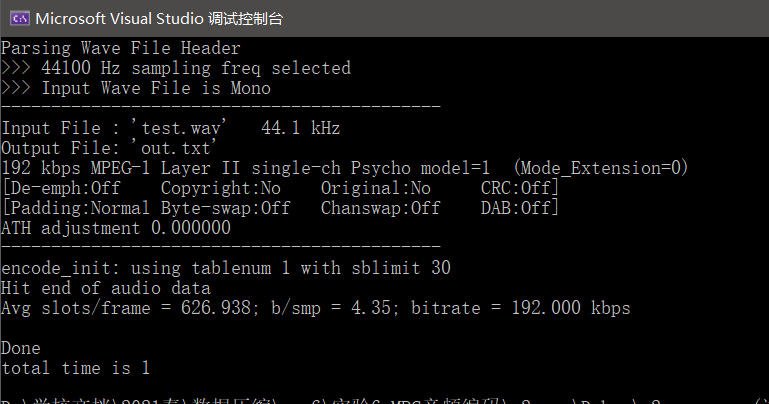
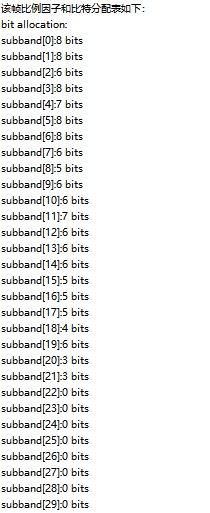
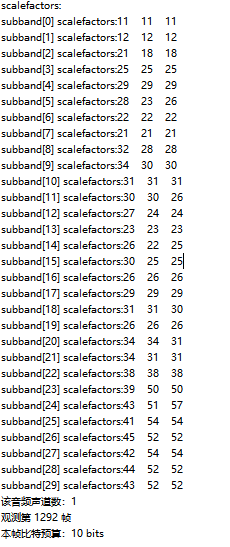
Noise
